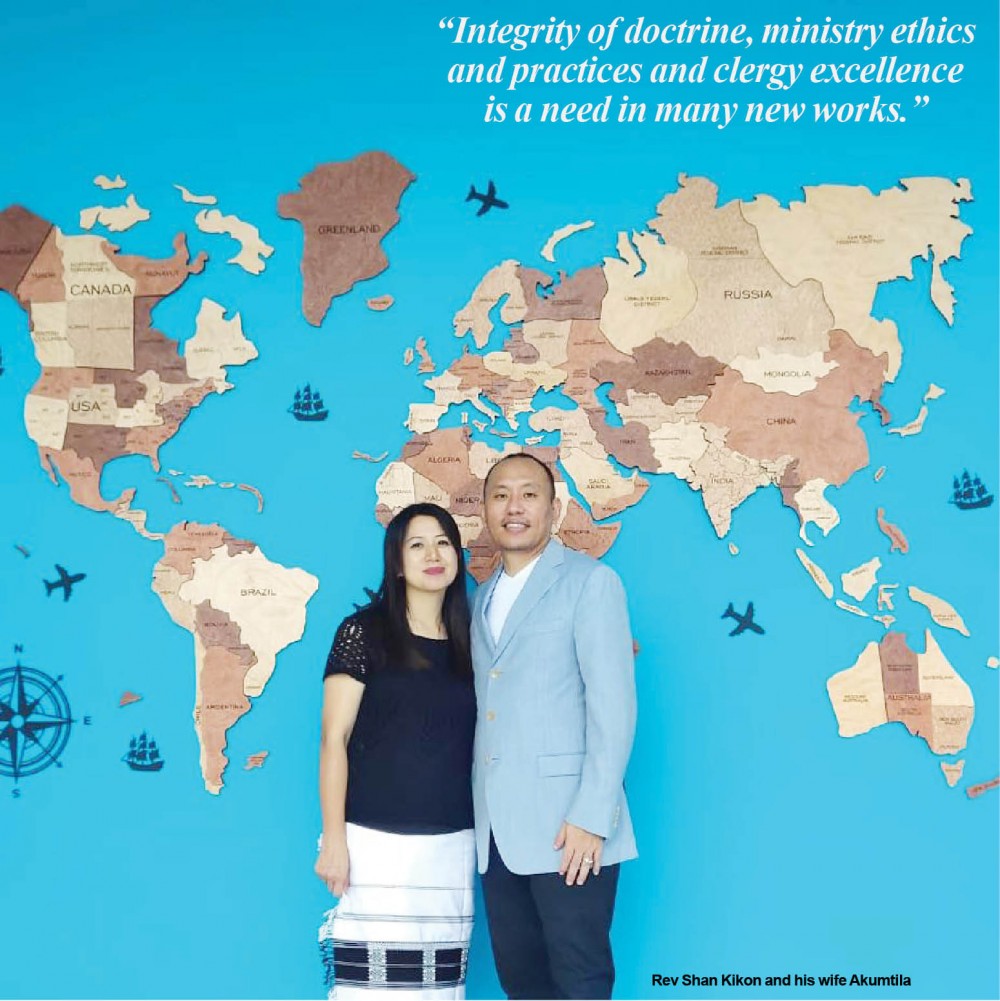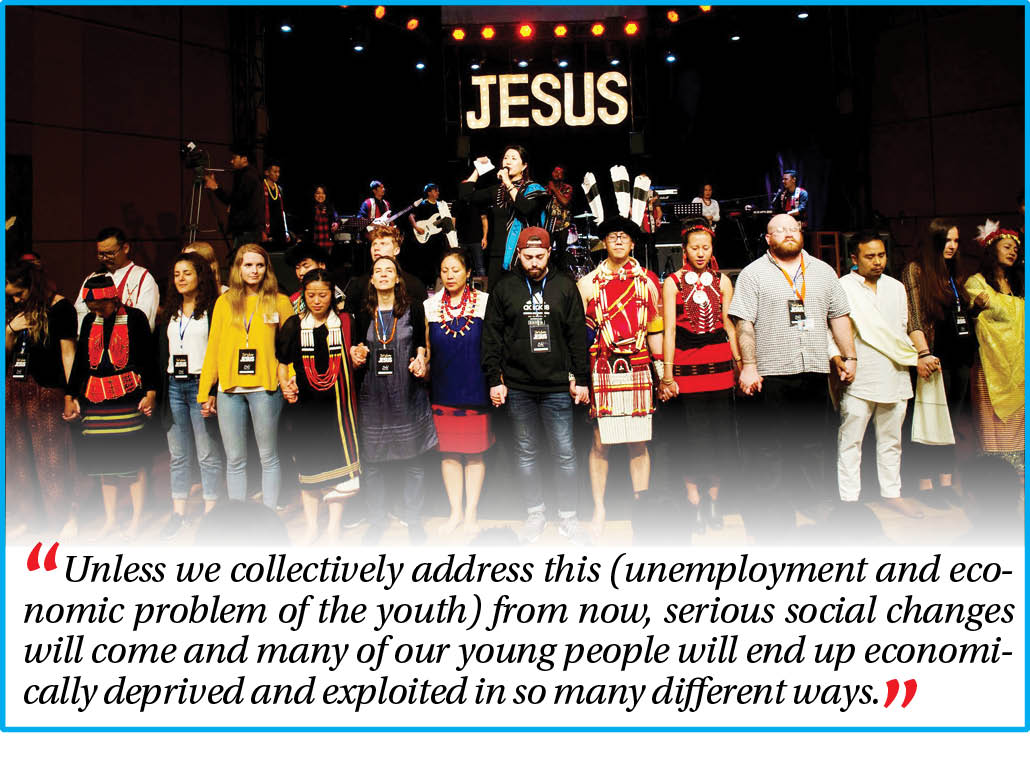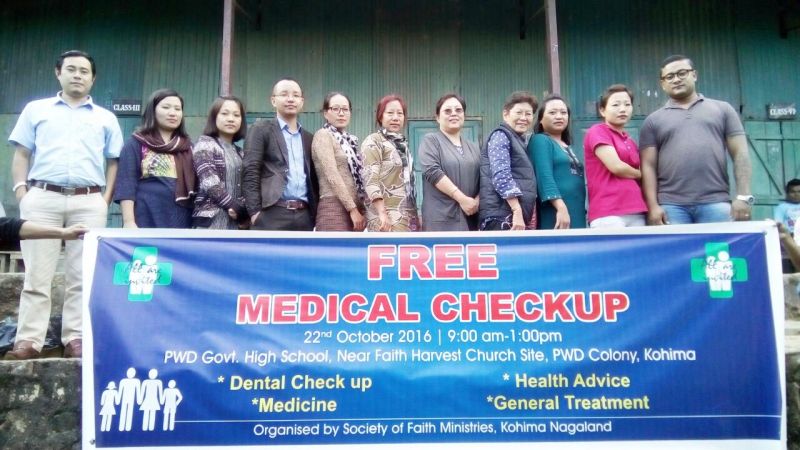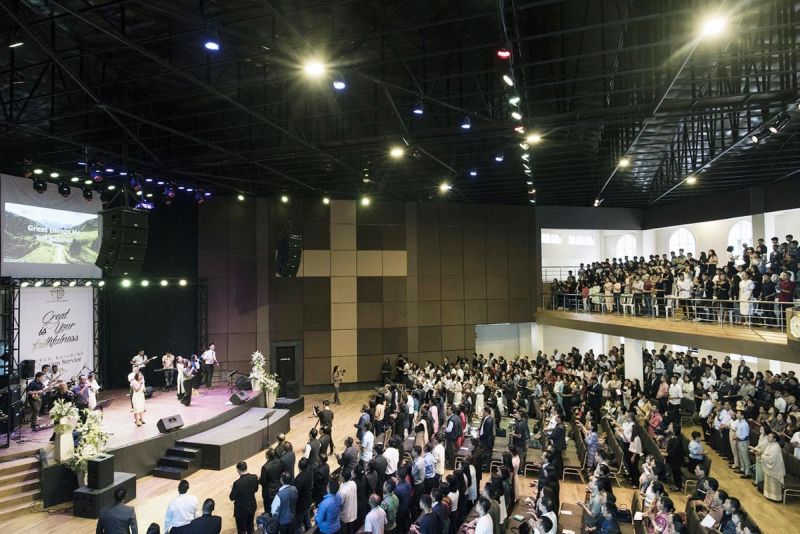

Morung Express Feature
Kohima | December 4
The COVID-19 pandemic has impacted churches and ministry works in several ways. But while it demanded the cancellation of Sunday Worship Service for successive months, churches have also enhanced the use of digital resources.
Faith Harvest Church in Kohima witnessed their media evangelism explode beyond their imaginations, enabling them to reach a global audience.
“The mad, rat race of the world that causes one to live stressed out, competitive and in a never ending pursuit for material success will only leave you empty, broken and unfulfilled within. Learn to live with one eye on eternity, so that your values and decisions are not compromised and you are able to leave this world with confidence and hope when your time comes.”
“The wrong values practiced by our society such as valuing government jobs above others, relying on nepotism for advancement and seeing ourselves as ‘tiny tyrant landlords’ over the other communities that come to Nagaland has created wrong expectations in our youth.”
“The youth must be the place where churches spend most of their time and resources. To lose the youth, will be to lose the future of the church.”
For the first series of the ‘Beyond Pulpit’ column, The Morung Express spoke to Rev Shan Kikon, Senior Pastor of Faith Harvest Church, Kohima, who professes that the pandemic has not changed the message and that, the same gospel must be proclaimed louder.
In this exclusive interview, he also talks about the role of church in politics, some of the main issues the youth of Nagaland are facing today and how the church deals with issues such as premarital sex, teen pregnancy and divorce.
 MExN: What is the inspirational story behind your commitment to Christian faith?
MExN: What is the inspirational story behind your commitment to Christian faith?
Rev Shan: I really can’t say if it is inspirational. I came to know Jesus with conviction and understanding only in the year 1996, while working in a very small company in Singapore. It was after reading CS Lewis’ Mere Christianity. That book answered many of my questions and brought me to an experience where my heartfelt ‘like it found its right place’. It was as if the key finally fit into the right keyhole. Christianity became more than a word, a religion and a tradition for me. It became a living person with whom I have the privilege to relate and know in love. Since then, I have realised that the greatest privilege in life and eternity is to lead others to the same revelational experience of knowing Christ. I would say, that encounter with Christ is the main reason behind my commitment.
My initial foundation in faith was also through the books and testimonies of real men and women of faith who lived pioneering lives of faith and miracles despite all odds. I really don’t remember delving into philosophical and theological books early on in my journey. Those stories put into my heart a similar desire to walk a walk of faith.

Rev Shan: I am not the founder of FHC, even though many regard me as such. Before me the church existed as a fellowship that began to meet for about a year at the old Hotel Fira, holding Sunday services. I joined as the pastor in the year 2002, January, with about 20 young people who were already there willing to journey with me in faith.
However, I would mention here that God was already working in Kohima in the late 90’s through a move of the Spirit in several independent fellowships that sprung up all over the city. During that time many of us felt that it is God’s will to establish an independent, Spirit-filled church in Kohima that would act as a lighthouse church for the new generations to come. So many of us were already praying since then.
I would say that FHC is a result of the prayers of hundreds of hungry saints who wanted to see the kingdom of God grow in Nagaland.
MExN: What is your understanding on the local church as an agent of social transformation?
Rev Shan: The local church for me is Heaven’s Gateway for anything that God wants to do in a local community. It must be the seed and the leaven that God uses to leaven the entire society. Therefore, we must stop seeing ourselves just as a denomination, an organisation or a religious body, but see ourselves the way God sees us - in our spiritual identity; as the light and salt of the community and become one of the primary agents for societal transformation.
MExN: What is your opinion on the role of the church in politics? And should the church be involved in the state politics?
Rev Shan: All rightful governing authority comes from God. Therefore, I believe even political authority flows from God. The kingdom of God is not to be confined to the four walls of the church. God wants His will to be manifested not only in church but also on the earth. That includes politics, business, education, etc. I believe godly Christians must take a very active role in politics. The only way we can transform politics in our state is for Christians to enter into the field and be like leaven, bringing positive influence through their presence. Criticising and judging corrupt politics from the pulpit is actually counter-productive.
However, I don’t believe that the church as an organisation or a body should be actively involved in politics to the point where it endorses parties or candidates and involves in political activities. Having said that, the word involvement can have so many different connotations which we need to clarify. When the church acts as a pressure group, lobbying for certain legislations, would that be considered being involved? I personally see no problem in the church acting as a voice of pressure or a voice of conscience to politicians so that right policies are legislated.
MExN: What is your observation on the mushrooming of so many para churches (outside and across denominations) in Nagaland? Do you think this should be a concern for the already established churches? And what would you suggest for different churches to co-exist in the same society?
Rev Shan: The kingdom of God throughout church history has always advanced through the dynamic, pioneering work of men of faith, empowered by the Spirit of God. God is always doing new things in every generation. The harvest field is too vast for just one or two denominations to manage. So, we will continue to see the mushrooming of new churches and ministries till Jesus comes again. This is a fact, a truth and a reality that all church leaders must accept.
For the already established churches and denominations to be overly concerned and threatened about this is to deny our own historical reality when the Protestants broke away from the Catholic Church. That was still of God. Why can’t new works today be from God?
Of course, we understand the genuine concerns of sincere leaders. Integrity of doctrine, ministry ethics and practices and clergy excellence is a need in many new works. However, the differences can be solved if only the churches are willing to co-exist in a relationship of honour, love and mutual fellowship, beyond just their own denominations. Instead of treating the new ministries as competition, why can’t the established churches see them as part of the same family working to build God’s kingdom together. This way we can help and learn from one another.
MExN: What do you think are some of the main issues the youth of Nagaland are faced with today?
Rev Shan: First, a crisis of belief. Through our exposure to media, western culture and liberal education, post-modern, moral relativism and liberal ideologies is creating a millennial generation that has little bearings and moral compass to navigate the seas of the future. I foresee days when we will see a greater erosion of our moral and cultural values.
Secondly, I see a social-economic crisis. Our education system is ancient and outdated and it cannot educate our youth to handle and engage with the changing complexities of a demanding worldwide economic system that wants trained, skilled and creative workers continually. I am afraid that the majority of our youth will be unemployable in the days to come. The problem is not only because of the education system. The wrong values practiced by our society such as valuing government jobs above others, relying on nepotism for advancement and seeing ourselves as ‘tiny tyrant landlords’ over the other communities that come to Nagaland has created wrong expectations in our youth.
MExN: As a church that is especially popular among young people, is there a particular way through which you reach out to them?
Rev Shan: We only seek to preach the same gospel as in the Bible in as authentic and meaningful a way as we can, but also in a relevant and modern manner so as to connect to the times.
We believe that the work of missions must not only be geographical, but also generational. Therefore, the youth must be the place where churches spend most of their time and resources; to lose the youth, will be to lose the future of the church.
Marketers, business corporations and the media understand the power of influencing the youth at a very young age. Therefore, the church must also learn to influence the faith of the young through all available means.
We seek to create an environment in our church building, programs and events that appeal to the young. We seek to reach the youth through media, music and events that are relevant to their issues and challenges.
MExN: Can you tell us more about your ministry—'We Care’, the social action arm of Faith Harvest Church?
Rev Shan: The social action arm of the church functions through The Society of Faith Ministries. In the church it is through the banner of ‘We Care’. We have been doing this since 2002. This is just a simple and humble way of extending the love and compassion of God to the community. We believe we exist not only for our congregants, but also for the community.
We regularly give food and clothes to the poor and also help in paying school fees, hospital bills, funeral costs, etc., as the need arises. We regularly conduct medical camps through the doctors of our church in Kohima and Assam. We also assisted in setting up of a small library in a government school. During the pandemic we have rendered aid to over 400 families so far, in cash and kind, and will do so to another 500 families in the coming week. We have also been able to help several other churches and pastors.
MExN: How has the COVID-19 pandemic affected your evangelism?
Rev Shan: Yes. To some extent the local activities have been hindered. However we have seen our media evangelism explode beyond our imaginations and we have been able to reach a global audience. We have been able to pray, counsel and minister to people beyond our church and also in several nations. The pandemic has actually helped us to reach more people. From about a 1000 a week that we could impact before the pandemic, we are now reaching to over 50,000 and more, a week now through our media.
MExN: In these times of global crisis, how do you manage to keep the faith of your congregation going?
Rev Shan: We just focus on feeding and preaching the Word of God without any change. The pandemic has not changed our message. It is the same gospel that must be proclaimed louder. We believe that as we teach regularly online, people will be fed. We have done several things like regular zoom prayer meetings , zoom discipleship classes, zoom seminars on specific subjects, audio messages sent to Nagamese congregants, online preaching on facebook and youtube, revival meetings, a short term bible school and also opened a prayer house where people can come and spend days in prayerful retreats. All of these have helped people in renewing their faith.
The pastors and leaders also make regular phone calls to the members of the church, just to enquire on their well being. Counselling for healing and other prayer needs are done through WhatsApp video calls.
MExN: How does FHC handle issues such as premarital sex, teen pregnancy and divorce?
Rev Shan: Our first response is always for restoration, not ex-communication (Gal 6:1), for loving discipline and not for punishment.
When someone goes through any of the above mentioned, we seek to resolve the issue through counselling and bible study, that seeks to restore the faith of the party involved. There is a period of suspension of membership that they must go through. It is not ex-communication period, but suspension. However, the details of every case are different depending on the context and situation.
MExN: Are there certain social issues that you are particularly passionate about? How do you address them as a church leader?
Rev Shan: Not really. I touch on all relevant social issues as I see the need to address them. I don’t think there is any specific issue that I care more for than the others. But in saying this, I must say I do think a lot more about the unemployment and economic problem of the youth. Unless we collectively address this from now, serious social changes will come and many of our young people will end up economically deprived and exploited in so many different ways.
MExN: Any message you would like to share for our readers?
Rev Shan: Never be afraid to walk your own path and forge your own destiny. My father was a bureaucrat and so many expected that I would walk that same road. However, I chose to follow the convictions of my passion and belief. I knew that I had to unveil my own identity and person through my own works. I faced many challenges from people and society- rejection, insults, slander and false reports. I even questioned myself several times. There were fears and burdens within. But I had made a decision to walk this road, and whether I succeeded or failed, was recognised or reviled, I decided that I was not going to turn back.
Trust in the amazing grace of God. God is better than we think He is, more loving than we know He is and even more amazing that we say He is. There is no true freedom in life like living with utter dependence and trust in Him. We will never know true joy until our lives are lost in Him.
Lastly, I would encourage everyone reading this to live with an eternal perspective to life. The mad, rat race of the world that causes one to live stressed out, competitive and in a never ending pursuit for material success will only leave you empty, broken and unfulfilled within. Learn to live with one eye on eternity, so that your values and decisions are not compromised and you are able to leave this world with confidence and hope when your time comes.








